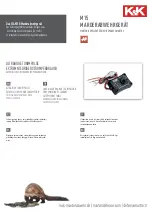
1.3) Encoder
Gate/door movement is detected by a shaft rotation control system that reads the marks on a wheel mounted on the driving shaft.
Two LEDs indicate the correct functioning of this reading system: when the shaft is made to turn these LEDs should flash while
the marks are being read.
1.4) Intellibent clutch:
The ENCODER is mainly used to control the position of the gate/door during movement. This same system can also read
gate/door speed constantly.
By assessing the speed of the motor, the control card can automatically compensate for variations in voltage and take
appropriate action if movement is obstructed.
A drop in speed below a given limit (adjustable) would normally indicate that an obstacle is in the way and cause the safety logic
on the control board to trigger, however there are also other factors that could cause this drop in speed: a voltage drop would
cause the system to trigger and a rise in voltage would provoke greater pressure before the system triggers. For these reasons
Nice
has designed its own “intelligent” clutch system.
During movement the “average speed” is calculated constantly and updated. A percentage reduction (adjustable with the
trimmer) is calculated with respect to this speed and this is the triggering limit threshold.
With this method, if there is a drop in voltage for instance, average speed would be slower and, automatically, the triggering
threshold would also be lower.
If, during movement, the clutch system triggers, movement will be stopped with the aid of the brake (that removes the residual part of
accumulated kinetic energy). If one of the automatic functioning modes is active, a movement in the opposite direction will be started.
However, to increase the level of safety still further, if the clutch triggers three consecutive times without ever reaching the natural
end of movement, movement will be stopped without reversal.
1.5) Imputs:
When the unit is first powered up, the indicator lights on active(closed) inputs will turn on indicating that the 24 V d.c. voltage is
present. Normally, the LEDs on the safety inputs, PHOTOCELL, PHOTOCELL2 and STOP, are on while those on the command
inputs, STEP-BY-STEP, PARTIAL OPENING and TIMER-OPENING, are off.
1.6) Jumper for clockwise and anticlockwise rotation:
It is essential to define the direction of rotation of the motor required for the open and close manoeuvres: PHOTOCELL should
trigger mainly in closing, while PHOTOCELL2 mainly in opening. When the gearmotors are made they are set for clockwise
rotation of the shaft in opening and anticlockwise in closing. If you wish to change rotation direction you have to reverse the motor
connector AND you must also “instruct” the encoder so it will correctly interpret the pulses that reach the optical reading system.
This is done via the tag jumper “J8” which should be pulled out turned 180’and plugged back in.
1.7) Small keys:
When the gearmotor is being installed it is often necessary to move the gate/door from one side to the other. This can be done
using the three small keys “OP”, “CL” and “<<>>”: with “OP” you activate gate opening movement, with “CL” you activate gate
closing movement and with “<<>>” movement speed is increased in the case of a slow movement phase. The same three keys
serve in programming for the memorisation phase.
1.8) “ok” led:
The purpose of the “OK” LED is to signal the correct functioning of the internal logic: regular flashing at 1 second intervals means
that the internal microprocessor is active and everything is in order. Fast flashing at 5 second intervals means that the unlock
lever is open, that the supply voltage is insufficient or that an incorrect programme has been selected.
When there is a variation in input state or if a dip-switch is moved, the LED will flash twice quickly.
2.1) INSTALLATION INSTRUCTIONS:
When installing the gearmotor follow all the instructions given in the enclosed instruction manual. It is necessary to underline that
the gate/door must be equipped with the necessary mechanical travel stops which are essential for the correct functioning of the
“Travel limit search” and are required in order to comply with point 5.2.1 of the prEN 12453.
Do not install the gearmotor unless the necessary “Mechanical travel stops” have been installed!
These stopping devices must be able to stop gate/door movement under any conditions; it is advisable to check that the reaching
of the mechanical stop point is not cause of a hazard and that the safety margins are always complied with!
Make absolutely sure that the mechanical stop is able to withstand and absorb, without the slightest deformation, all the kinetic
energy that has accumulated with the gate/door movement!
Install all the necessary control devices (key switch or push button) and safety devices (emergency stop, photocells, sensitive
edges and flashing lights). Now make the necessary electrical connections as described below:
Eng li sh
2 0

































